Is Japan finally turning the corner?
Japanese voters recently turfed out the party that has ruled the country since 1955, and replaced it with a party that has never governed before. Cris Solto Heaton explains what this means for Japan's economy, and why, although investors are right to be cautious, there are plenty of reasons to be optimistic.

Get the latest financial news, insights and expert analysis from our award-winning MoneyWeek team, to help you understand what really matters when it comes to your finances.
You are now subscribed
Your newsletter sign-up was successful
Want to add more newsletters?

Twice daily
MoneyWeek
Get the latest financial news, insights and expert analysis from our award-winning MoneyWeek team, to help you understand what really matters when it comes to your finances.

Four times a week
Look After My Bills
Sign up to our free money-saving newsletter, filled with the latest news and expert advice to help you find the best tips and deals for managing your bills. Start saving today!
Last week, more than 50 years of history was swept away in Japan's general election. The Liberal Democratic Party that has ruled the country almost uninterrupted since 1955, found itself out on the street, replaced by a party which has never governed before.
But despite the size of the shift, many still doubt whether the incoming Democratic Party of Japan will change anything. Japan has promised change so many times, the reasoning goes; disappointment has always followed. Why should it be any different this time?
Investors are right to be cautious. The new government is not especially impressive and its commitment to reform is doubtful. But there are still reasons to be optimistic. Japan won't transform overnight but a very long period of change may have finally got underway
MoneyWeek
Subscribe to MoneyWeek today and get your first six magazine issues absolutely FREE

Sign up to Money Morning
Don't miss the latest investment and personal finances news, market analysis, plus money-saving tips with our free twice-daily newsletter
Don't miss the latest investment and personal finances news, market analysis, plus money-saving tips with our free twice-daily newsletter
The new government is firmly in control
First, it's important to appreciate the size of the turnaround. As you can see below, it's almost a complete reverse of situation before the election. The LDP has been reduced to a rump in the more powerful lower house of the Diet, while the DPJ now commands an impressive majority.
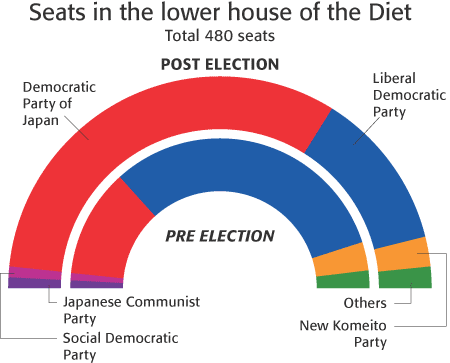
This is a shattering defeat for a party that has only been out of power for 11 months since 1955 and that was only due to a party split and defections in 1993-1994. Until now, the LDP had never lost an election. That in itself makes this result pretty significant.
Even more importantly, new Prime Minister Yukio Hatoyama and the other DPJ heavyweights should be able to put through almost any laws they want. They don't have the two-thirds supermajority that would enable them to override opposition from the upper house (which has a similar role to Britain's House of Lords) but they already control that part of parliament in coalition and have a good chance of getting an absolute majority in elections next year.
But that doesn't mean the DPJ will be forcing through major changes. Its members are not exactly political radicals. Many top figures are former members of the LDP, including Hatoyama and Ichiro Ozawa, who was party leader until stepping down earlier this year after a close ally was caught up in a fundraising scandal. And there's no sign of them breaking with Japan's tradition of political dynasties, in which sons often inherit their father's seat. Hatoyama is the grandson of one of the LDP's founders (as is Taso Aso, the incumbent prime minister he has just evicted from office).
In fact, much of the DPJ's campaign focused on protecting and strengthening Japan's traditional social model. Voters didn't plump for the DPJ because they wanted a break with the past. Indeed, they didn't so much vote for the DPJ as against the LDP, alienated by a long series of bureaucratic bungles, corruption scandals and three successive hapless and unimpressive prime ministers in as many years.
Not as grim as you'd think
There's good reason for this. Western commentators tend to portray Japan as a country that has been sunk in deep depression ever since the bubble burst in 1989. That's not completely accurate. Yes, it's been a lousy two decades for asset prices, with stocks and real estate steadily grinding lower and lower as the charts below of the Topix equity index and commercial land prices show.
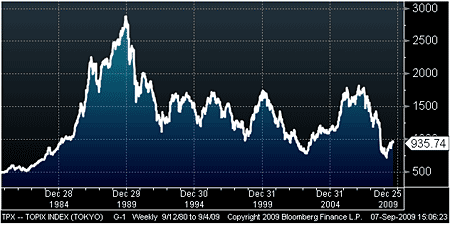
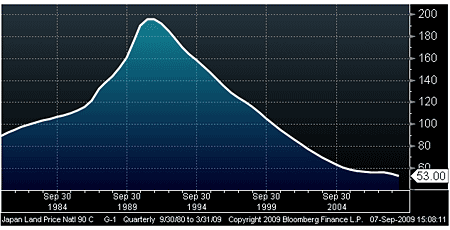
But Japan remains a wealthy country with many successful companies, a high level of technological progress, a good standard of living and high life expectancy. There are certainly problems, but not all of these are entirely due to the bursting bubble and failed government policies.
Take its much-discussed deflation problem, for example. Many people seem to believe that Japan plunged into deflation in 1990 and stayed there. But deflation didn't really emerge until 1998 and as the chart shows, the broad downward trend parallels what happened elsewhere in the world (the orange line is core consumer price inflation for the Japan, the green line is the US).
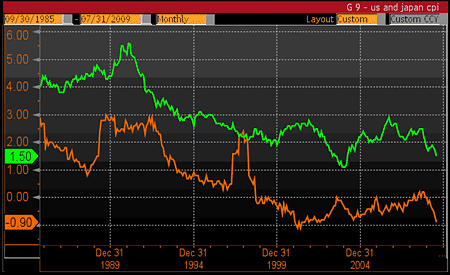
That's not saying that Japan didn't have a deflationary overhang as a result of its bubble burst and the balance sheet recession caused by its huge debt burden (something I discussed in more detail here: Don't abandon Japan). But the same 'great moderation' that made Western bankers look like geniuses who had tamed inflation, also probably played a major part in making Japan's look like buffoons who were unable to inflate their way out of their problems.
Similarly, Japanese workers have suffered from weak real wages in recent years, as the chart below shows.
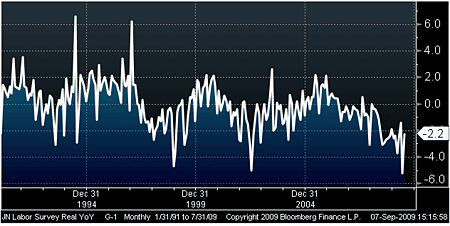
Undoubtedly that's partly due to structural problems in the economy, such as weak productivity growth and excess capacity after the bubble. But wages everywhere in the developed world have been under pressure due to competition from emerging economies in recent years. In addition, Japan has seen growing numbers of willingly part-time workers in particular women and retirees - enter the labour force in recent years, further depressing the headline earnings numbers.
So indicators like this can make things look worse than they really are. Likewise, recent unemployment may be high by Japanese standards, but it's still significantly lower than in most countries. And while GDP growth of 1-2% in recent years looks anaemic, given its ageing population, Japan's potential GDP growth isn't that much higher.
Focusing on the small things, ignoring the elephants
Overall, while conditions in Japan could be better, they're not as depressing as many think. So it's no surprise that in these situations, voters aren't looking for major upheavals. But they would like more job security, higher wages and so on and it was issues like this that the DPJ campaigned on. Unfortunately, its policies here restricting the use of temporary labour and increasing the minimum wage are unlikely to achieve much and could even be harmful.
Other pledges such as eliminating the time-honoured and corrupting tradition of amakudari or 'descent from heaven', in which senior bureaucrats retire to well-paid jobs in the industries they've been regulating, may deliver benefits by shaking up the 'iron triangle' of co-operation between the LDP, the bureaucracy and the keiretsu (interlocking business groups) that characterises the Japanese economy. This system helped direct Japan's development decades ago, but is now holding back progress.
However, tackling the powerful and entrenched bureaucracy will be a big task. The problem is that none of the DPJ's promises represent a clear plan to tackle Japan's big issues. Take the national debt, which has ballooned to 200% of GDP, inflated by years of the LDP's stimulus projects.
Immediately after the bubble burst, these probably served a useful purpose, preventing the economy from sinking deep into depression. But more recently, they have simply been wasteful pork-barrel patronage to keep the construction industry and rural voters behind the LDP. The DPJ has promised to stop this and redirect spending towards consumers, healthcare and tax cuts for small businesses. That's all well and good but what Japan really needs is a path for sorting out its debt problem, rather than just making it grow more slowly.
The other enormous issue is the ageing population and the costs that this will bring. The DPJ plans measures to boost the birth rate through subsidised child care but this is too little, too late. Perhaps surprisingly, Japan doesn't have such big ageing-related liabilities hanging over it as many other countries (about 160% of GDP compared to 500% for the US, according to a recent International Monetary Fund estimate), but they will be hitting sooner and will be coming to a country that already has a chronic budget problem.
Don't expect too much
Another reason to be cautious is that the DPJ doesn't clearly stand for anything. It was formed in 1998 by a union of four parties with very different policies and its driving force has been a desire to kick out the LDP. Once in power, it may succumb to infighting or perhaps even emulate the LDP in its dying years and focus on clinging to power rather than governing effectively.
That's the bad news. The good is that for the first time ever there has been a decisive change in government. The DPJ is likely to push through some changes, whether for good or bad. Meanwhile, the LDP will have to re-examine what it stands for and try to become a coherent opposition if it wants to return to power at some point (this could well lead to a split in what is already a highly factionalised party).
In short, while it's very possible that the DPJ won't make huge changes, it seems likely that the process of change has been set in train and will rumble on beyond well beyond the lifespan of this government. This makes me optimistic that Japan is finally about to turn the corner.
On top of the possibility of political renewal, there is the boost that the economy will get from the emergence of the rest of Asia and the likelihood that business investment a key drag on the economy for years will begin to pick up in response to this. The country's high-tech economy is also likely to profit from the global shift towards greener technology indeed, Hatoyama's announcement at the weekend of an ambitious target for reducing greenhouse gases should help put Japan in the forefront of this.
Add in the fact that the market remains extremely cheap and this continues to look a good long-term play for the patient investor (this certainly won't turn around overnight). As I mentioned in my previous article, the iShares MSCI Japan SmallCap ETF (LON: ISJP) looks a promising low-cost way to play it.
In other news this week
table.ben-table table { border: 3px solid #2b1083;font: 0.928em/1.23em verdana, arial, sans-serif;}
th { background: #2b1083; padding: 10px 5px;color: white;font-weight: bold;text-align: center;border-left: 1px solid #a6a6c9;}th.first { border-left: 0; padding: 5px 2px;text-align: left;}
tr {background: #fff;}
tr.alt {background: #f6f5f9; }
td { padding: 5px 2px;text-align: center;border-left: 1px solid #a6a6c9;color: #000;vertical-align: center;}td.alt { background-color: #f6f5f9; }
td.bold { font-weight: bold; }td.first { border-left: 0; text-align: left;}
| China (CSI 300) | 3,077 | +1.0% |
| Hong Kong (Hang Seng) | 20,319 | +1.1% |
| India (Sensex) | 15,689 | -1.5% |
| Indonesia (JCI) | 2,323 | -2.3% |
| Japan (Topix) | 936 | -3.5% |
| Malaysia (KLCI) | 1,179 | +0.4% |
| Philippines (PSEi) | 2,803 | -2.8% |
| Singapore (Straits Times) | 2,623 | -0.8% |
| South Korea (KOSPI) | 1,609 | +0.1% |
| Taiwan (Taiex) | 7,153 | +5.0% |
| Thailand (SET) | 668 | +1.7% |
| Vietnam (VN Index) | 528 | -1.5% |
| MSCI Asia | 101 | -1.0% |
| MSCI Asia ex-Japan | 431 | +1.3% |
Two senior leaders in the western Chinese region of Xinjiang were fired after further trouble in the city of Urumqi, where almost 200 people died in riots between Han Chinese and Uighur residents in July. The communist party chief for Urumqi and the head of the police for the whole region were dismissed after fresh protests left at least four dead.
The credit crunch continues to ease in Asia. Chinese property developer Country Garden became the first high-yield (riskier) private-sector borrower in the region to issue new debt for over a year, with a $300m five-year deal. The firm is paying an interest rate of 11.75%. Meanwhile, a backlog of mainland-related IPOs is building in Hong Kong as firms rush to take advantage of improved investor sentiment. Sinopharm, China's largest pharmaceutical firm, and mining group Metallurgical Corporation of China are in the queue, as are Evergrande and Glorious Property, two real estate firms that failed to float last year.
Secretive Swiss commodities trading group Glencore is reported to be in talks with potential outside investors, including two Asian sovereign wealth funds: China Investment Corporation and Singapore's Temasek. Glencore owns a number of mining assets, including a 35% stake in London-listed miner Xstrata, making it an attractive target for China, which has been trying to mitigate its dependence on commodity exports through a number of investments in foreign raw materials producers.
This article is from MoneyWeek Asia, a FREE weekly email of investment ideas and news every Monday from MoneyWeek magazine, covering the world's fastest-developing and most exciting region. Sign up to MoneyWeek Asia here
Get the latest financial news, insights and expert analysis from our award-winning MoneyWeek team, to help you understand what really matters when it comes to your finances.

Cris Sholt Heaton is the contributing editor for MoneyWeek.
He is an investment analyst and writer who has been contributing to MoneyWeek since 2006 and was managing editor of the magazine between 2016 and 2018. He is experienced in covering international investing, believing many investors still focus too much on their home markets and that it pays to take advantage of all the opportunities the world offers.
He often writes about Asian equities, international income and global asset allocation.
-
 Should you buy an active ETF?
Should you buy an active ETF?ETFs are often mischaracterised as passive products, but they can be a convenient way to add active management to your portfolio
-
 Power up your pension before 5 April – easy ways to save before the tax year end
Power up your pension before 5 April – easy ways to save before the tax year endWith the end of the tax year looming, pension savers currently have a window to review and maximise what’s going into their retirement funds – we look at how